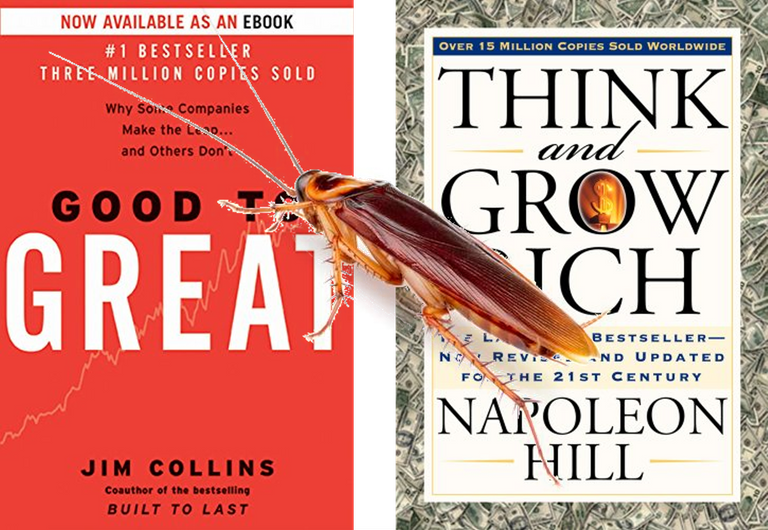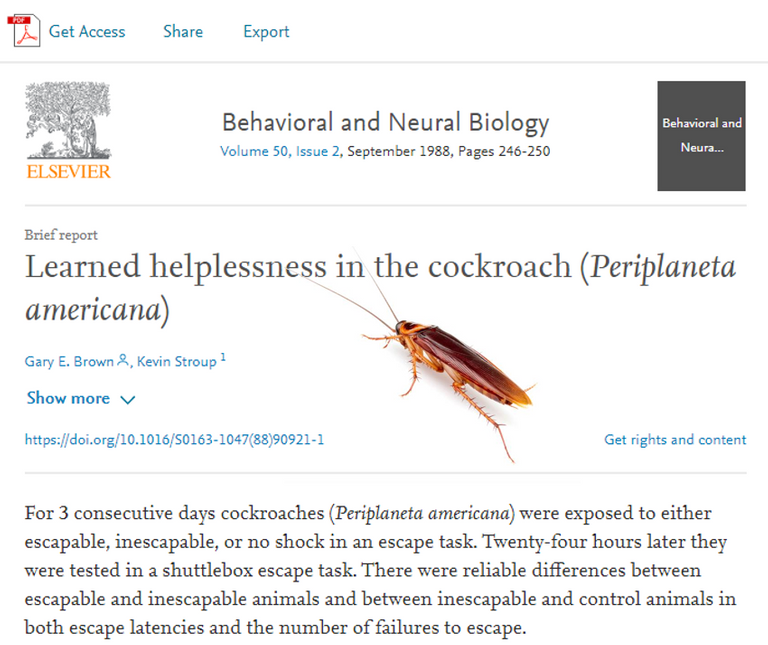"You can be successful too, if you do these 7 things!"
In 1937, Napoleon Hill published "Think and Grow Rich", one of the best selling "self-help" books of all time. Its recipe was pretty straightforward: N. Hill studied a great number of very successful people and identified a set of principles, attitudes, etc. that they all had in common. In the book, he lists and describes in detail these "principles" bundled into a "philosophy of achievement". The implication was direct: if the reader would be able to lead his life in accordance with these principles, he too could become successful.
Sixty four years later, Jim Collins applied a similar recipe to successful companies and published "Good to Great". In it, he analysed very successful corporations which had stood the test of time and derived a list of common characteristics these companies shared and which are deemed to play an essential role in the observed business performance. The message is again quite straightforward: if the reader (presumably a CEO of a company, for such a book) applies the findings of the book to his own company, he too can turn it into a "great" company.

This type of pseudo-scientific analysis has already been debunked by a number of thinkers in other books such as "Fooled by Randomness" of Nassim Taleb or "The Halo Effect" by Phil Rosenzweig.
However, I am convinced these falsely scientific approaches are here to stay and will resurface in different form over and over again, because they make "good copy". They convey a positive, upbeat message that readers crave: "You, too, can be successful! Buy and read this book! If you apply its teachings, you'll be successful! And if you are not successful after all, it's because you could not follow through with diligence" - not because the recipe is bogus.
In contrast, books like that of Rosenzweig are about as loved as party poopers. Their message is a hard sell: "Beware of simple recipes, things are often more complex than they at first appear"
Indeed, consider the following, which is a distinct possibility: for each successful person who applied the principles identified by Napoleon Hill, there were perhaps one hundred others who applied them just as thoroughly and still they failed. Because they failed, nobody knew about them and so Napoleon Hill could not include their number in his selection. This type of bias in analysis is called "survivor bias" - we only know about the "survivors", but generally have no idea how many similar individuals "died" (figuratively speaking). That is not a big problem for the author of a "self-help" book but if you want to follow its recipe, you might want to be able to assess your odds of ending up among the "dead" (or at least "failures"), because the time and effort involved in these endeavors is such that you can only try one path at a time, and often only once.
Should you "pick up the phone"?
In this context, I read a recent article published on Medium in June: "According to Steve Jobs, This One Thing Separates The Doers from The Dreamers". It applies the tried and true recipe of Napoleon Hill and Jim Collins by listing a number of people (starting of course with Steve Jobs) who succeeded (at whatever they were trying to achieve) by doing "this one thing" ... basically, daring to pick up the phone (or write or whatever) and ask for what they needed.
So basically if the lack of "something" stands between you and success, and you know who can provide you with that "something", you should "pick up the phone" and call that person and ask him or her for what you need.
Sounds pretty commonsense and it's bound to unleash a sigh of relief in many a reader who was previously wrenching his hands over the matter ... after all, what do you have to lose, right ? If you are lucky, you stand a chance of getting what you need. And that, only by trying.
At worst, you'll be turned down but so what ? All you stand to lose is a bit of time, right? Losing some time might or might not be a problem. If you can put an upper boundary to the amount of time you might lose (if all the attempts fail) it's somewhat better.
Of Cockroaches and Men
However, in practice, things are rather more complicated. Neurological and psychological research on a number of animal species have shown that in these situations, a lot more is at stake than "wasting a bit of time". Indeed, it's not because of the fear of "wasting their time" that most people do not dare to "pick up the phone and just ask". It's because they fear failure, they fear rejection.
What all these books and articles with recipes for success imply is that no one should be fearing failure and rejection, that such a fear is unworthy and should be simply cast aside and ignored. But is it reasonable to ask such a thing?
Learned helplessness
Back in the late 1960-ies, psychologists studying depression discovered that people confronted with negative events (such as pain) which they believed were "inescapable" developed a kind of apathy which persisted even after the inescapable events had ended.
These people remained apathetic and made no attempts to escape the pain even later, when presented with "escapable" sources. It was as though they had learned that nothing they could do would change anything, as though they learned that they were helpless.
Researchers dubbed this mechanism "learned helplessness" and wanted to see whether it is specific to humans. So they developed animal models, starting first with dogs. And they observed that dogs, too, displayed this psychological mechanism, that dogs too were able to "learn that they were helpless" and as a consequence submit, for instance, to shocks even when these would have been easy to escape.
A couple of decades later, scientists proved that this mechanism was incredibly old and existed in species with very rudimentary "neural systems", like the common cockroach. Its presence in species so far apart as humans and cockroaches is testimony to its high evolutionary significance.
It follows that "fearing failure" is not something irrational, to be willed or educated away, but rather a protection mechanism. Suffering rejection and failure are not without consequences, they take a toll on our mental fortitude, and they do so at such a basic neural level that even cockroaches cannot "shrug it away".
Do "pick up that phone"
Do not think that I want to prevent you from picking up the phone and asking that benefactor you know for whatever you need. However, do not take this lightly. Give it a deep thought and assess the odds. Do not make the mistake of thinking that all you have to lose is a bit of time. If you do not succeed, if you are rejected, some neural circuitry which we have in common with the cockroaches will "fire up" and take you one step closer to "learning" that "you are not in control", that "whatever you do, is useless". It might be a totally inappropriate "conclusion" to draw from that single failure but it's not less a biological constant that you want to avoid.
Conclusion
More generally, do not take "trying" lightly. Even if, at first sight, all you have to lose is "a bit of time", in truth there are "cockroaches lurking in the depths of our brains", and these little beasts gnaw constantly at our self-confidence, which gets eroded with each and every unsuccessful trial. Hence, it's in your own best interest to make sure you have better-than-even odds when attempting something which might seem a bit of a long shot.

Congratulations @sorin.cristescu! You received a personal badge!
You can view your badges on your board And compare to others on the Ranking
Do not miss the last post from @hivebuzz: